Feature: A DAY OF ACTION - a Collaboration with the University Musical Society and Yo-Yo Ma!
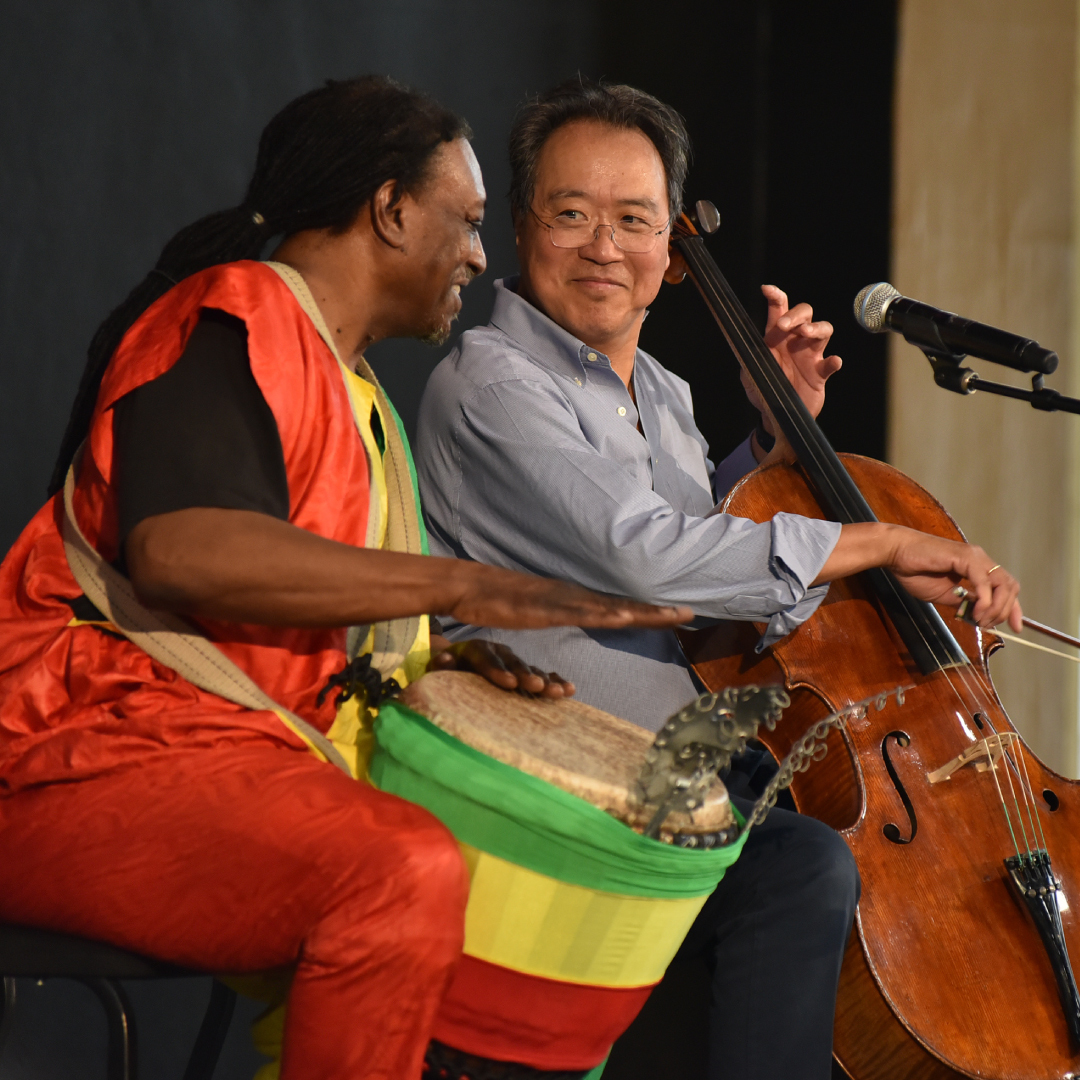
Yo-Yo Ma in a spontaneous performance.
Photo Credit: Peter Smith Photography
The residents of Flint and Ann Arbor, Michigan were treated to a very special event because of the University Musical Society (UMS): Yo-Yo Ma visited as part the performer's two-year journey to perform Six Suites for Solo Cello as a catalyst for social action and it marks the first time Ma extended the model beyond the Bach Project to a broader audience. Ma's visit was two-days filled of activities including a talk by him in the University of Michigan's Hill Auditorium on "Culture, Understanding, and Survival," as well as a Day of Action in Flint, Michigan with the theme, "Flint Voices: Culture, Community, and Resilience." At the Day of Action, Ma worked with community partners to transform lives and forge both a more connected world and a healthy and vibrant local community with the goal of the session to find new opportunities for collaborations across Flint's cultural communities and organizations. The strategy session was followed up by a community cultural show that was a celebration of Flint's vitality, diversity, and artistry. BroadwayWorld Detroit had a chance to speak with two of people heavily involved in bringing Yo-Yo Ma and his Day of Action event to Michigan - Jim Leija (director of education & community engagement for UMS) and Natasha Thomas-Jackson (Flint-based arts advocate). Read our interview with them to see why this was an important event:
BroadwayWorld Detroit: Can you give our readers a brief background of yourself and then your career as an introduction?
Jim Leija: I've served on UMS's senior management team as director of education & community engagement since 2011, providing the strategic direction for UMS's community, University, and K-12/youth engagement and education programs, and I lead the team that produces over 300 free or low-cost education events and a range of educational materials each season. The goal of our program is to make the performing arts accessible to everyone, and to help individuals make relevant, inspiring, and transformational connections between the performing arts and life.*Natasha Thomas-Jackson: I'm a performance artist/arts administrator, writer, and activist. I am currently working for the Michigan Organization on Adolescent Sexual Health overseeing the creation of a statewide Youth Advisory Council on HIV/AIDS, hosting a Youth Summit on HIV, and working to build Gender and Sexuality Alliances (GSAS) in schools throughout Genesee County. My writing has been featured in digital publications/academic journals such as the Hollywood Reporter, The Body is Not an Apology (TBINAA), and Kalfou: A Journal of Comparative and Relational Ethnic Studies. I wrote the foreword for IMAGN - Increasing Minority Awareness of Genetics Now, a report co-sponsored by the Black Congressional Caucus and the John Hopkins University Genetics and Public Policy Center. I'm also a Resident Artists for VSA-Michigan, which collaborates with educators in elementary and secondary schools to integrate dance, drama, music, literary, media and visual arts with the language arts, math, science, and social studies curricula in inclusive general and special education classrooms. I currently teach mindfulness, movement, and poetry in two special education classrooms with students have cognitive and emotional impairments.*
*For Jim Leija and Natasha Thomas-Jackson's full bio's, please see the bottom of this feature.
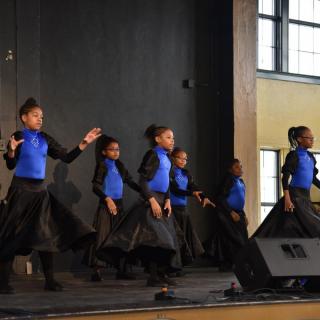
Day of Action arts showcase.
Photo Credit: Peter Smith Photography
How would you describe the Day of Action in your own words?
Jim Leija: The Day of Action project was an opportunity for Flint community members to tell their own story and to raise their voices in the ways they wanted to be heard. UMS helped convene a Flint community planning group to organize the Day of Action activities, and through a series of site visits and community meetings that group developed the Day of Action activities and the theme "Flint Voices: Culture, Community, and Resilience." On the Day of Action, in the morning, a group of community leaders and culture makers came together to strategize on ways that culture can be more inclusive in Flint. In the afternoon, Berston Field House (a historic community center in north Flint) hosted a community cultural showcase that lifted up the culture of Flint - everything from mariachi music to African drumming to the local journalism community and vendors from the Flint Farmers' Market. Even as someone who was at the center of the planning, I was just absolutely blown away by the spectacular display of Flint pride at Berston Field House.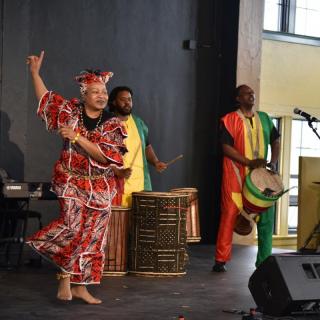
at the Day of Action arts showcase.
Photo Credit: Peter Smith Photography
Natasha Thomas-Jackson: The Day of Action was meaningful, fun, intentional, and necessary. It was an opportunity for community members to strategize, learn, listen to, and celebrate one another. It was a day for us...our voices, our ideas, our food, our dances, our songs, and our similarities and differences to converge and mingle. It was magical.
What was your role in curating the Day of Action?
Natasha Thomas-Jackson: My role was to bridge community partners and resources to plan and implement the two parts of the Day of Action: the strategy session in the morning and the arts showcase in the evening. Essentially, curation involved bringing people together, creating space for ideas to flow, and recruiting amazing local artists and educators to create a day of intentional dialogue and celebration of inclusion, culture, and intersectionality and the resilient spirit of Flint.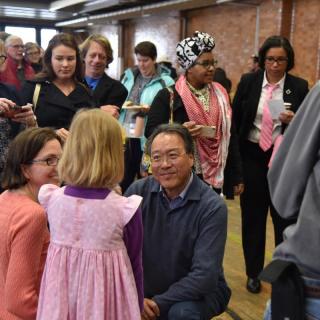
Photo Credit: Peter Smith Photography
Why do you think the event was important to the Flint community?
Natasha Thomas-Jackson: Absolutely. The level of collaboration necessary to make this Day of Action diverse and vibrant really deepened some connections and bolstered our commitment to continued partnerships.What makes this event stand out from other art events that happen in Flint and the surrounding area?
Natasha Thomas-Jackson: How truly collaborative and diverse it was...racially, economically, artistically, generationally, and culturally. There were so many different voices, contributors, tastes, sounds, and ideas. This event brought together people who might have, otherwise, never met. It brought people to spaces they may have, otherwise, never visited.What made University Musical Society Education and Community Engagement want to bring Yo-Yo Ma's Bach Project to Michigan?
Jim Leija: At UMS we're always looking to further our reach, and make new friends and collaborators in communities throughout Michigan. Yo-Yo's project gave us the chance to introduce ourselves to Flint in a big way, and for us to learn about community members and organizations that are deeply involved in youth and community development, culture, and arts. First and foremost, though, we saw this as project as an opportunity for the Flint community to speak for itself and tell its own story. We brought folks together knowing that Yo-Yo would bring a lot of attention to Flint on a national scale, and we asked community members how they wanted to be heard and seen in this context. What developed was an opportunity for community members to draw positive attention to Flint and highlight its thriving culture scene and the many community resources that make it a great place to live.**For more information on Yo-Yo Ma's Bach Project, please see the bottom of this feature.
What was it like working with Yo-Yo Ma?
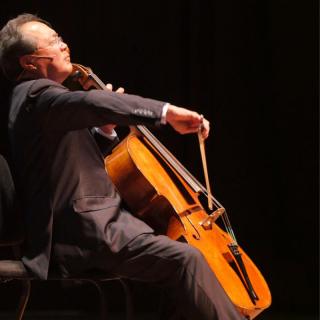
Photo Credit: Peter Smith Photography
Jim Leija: Yo-Yo is one of the most generous and thoughtful people. He has a genuine interest in all of the folks he meets, and he's clearly an intellectual omnivore. He has a deep belief that culturemakers have a responsibility to lead us to a better future. I'm really inspired by Yo-Yo's leadership, particularly from his home base of classical music. He's one of the few artists of his caliber that is using his artistic platform to spark conversation about social change. I hope other artists follow his lead, and explore how they can bridge the worlds of artistic excellence and social change. I'm also inspired by the way that Yo-Yo is drawing attention to artists who already work in this realm, like Flint-based artist Tunde Olaniran who hosted Yo-Yo during the Day of Action.
Do you think he brought a lasting impact to the people who attended?
Jim Leija: Absolutely, the sense of pride is palpable and continues to reverberate in the community. There's already talk of an annual event at Berston Field House that would continue to use the cultural showcase model we evolved together for the Day of Action. The groups that came together to plan the event, and others that convened on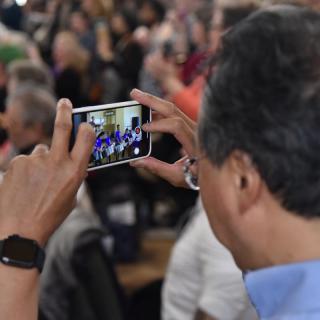
Photo Credit: Peter Smith Photography
the Day of Action itself have built new connections and refreshed old ones. The planning group represented a real crosscut of big institutions and grassroots organizations working together. I suspect this way of working has already sparked ideas for future collaborations. I know it has for me.
Natasha Thomas-Jackson: Yo-Yo Ma was so warm and engaging. He really connects with people in ways that are authentic and heartfelt. He listened to the community. He asked important questions. He laughed and made others laugh. And when he played, people cried. We know that Yo-Yo is a brilliant musician, what we didn't know was that he is also emotionally intelligent and deeply humanitarian. During the week of the Day of Action, a family member of mine passed away. Yo-Yo Ma and Sophie Shackleton sent flowers to my home expressing their condolences. I was really struggling that week and Yo-Yo, Sophie, and Emilio Rodriguez and Jim Leija of UMS all made sure I was seen and supported. It was a personal touch and I deeply appreciated it.
Do you think he brought a lasting impact to the people who attended?
Natasha Thomas-Jackson: Definitely. He really made a human-connection with the people hear. He shook hands. He hugged. He smiled. In so many pictures from the DOA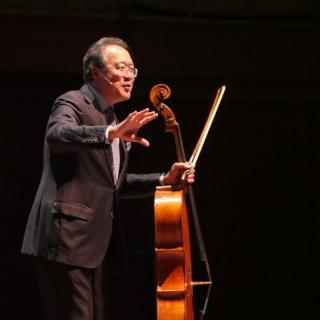
Photo Credit: Peter Smith Photography
events, you see people laughing with Yo-Yo. You see excitement and bright faces. You see joy and celebration embodied in the interactions between Yo-Yo and members of the community. It was a beautiful and powerful thing to witness.
What was the biggest take away from the Day of Action event?
Jim Leija: Flint is a city of incredible culturemakers who support one another and have a real sense of pride in their community. It's been incredible honor and inspiration to work with this community, and I look forward to more in the future.Do you have a personal social media contact that our reader can connect with you on?
Jim Leija: You can connect with me on Instagram at @manthatgotaway and Twitter at @jimleija.Natasha Thomas-Jackson: You can connect with me on Twitter at @NatashaTheory and on Facebook at facebook.com/natasha.thomasjackson.
More about the Day of Action and what went on can be found here: ums.org/dayofaction. To find out more programs that the University Musical Society (UMS) Education and Community Engagement is putting on, visit https://ums.org. You can also connect with them via all their social media accounts on Twitter at @UMSpresents, on Instagram at @UMSpresents, and on Facebook at facebook.com/UMSpresents.
Connect with Yo-Yo Ma on Twitter at @YoYo_Ma, on Instagram at @yoyoma.official, on Facebook at facebook.com/YoYoMa, and www.yo-yoma.com.
ABOUT Yo-Yo Ma'S BACH PROJECT: Yo-Yo Ma's visit to Michigan is inspired by his two-year, globe-spanning Bach Project, which began in August 2018. For Ma, Bach's 300-year-old music is one extraordinary example of how culture connects us and can help us to imagine and build a better future, but he believes there are many, many more. And for Ma, culture includes not just the arts, but everything that helps us to understand our environment, each other, and ourselves - from music and literature to science and food. The Bach Project explores and celebrates all the ways that culture makes us stronger as individuals, as communities, as society, and as a planet. Information about Yo-Yo Ma's Bach Project can be found at bach.yo-yoma.com.
ABOUT Yo-Yo Ma'S DAYS OF ACTION: These public events and creative experiences are different in every location; they aspire to local relevance and global significance; they demonstrate culture's power to create positive change; they inspire new relationships, connect partners across locations, and ask us all to keep culture at the center of our efforts to build a shared future.
ABOUT UMS: A recipient of the 2014 National Medal of Arts, UMS (also known as the University Musical Society) contributes to a vibrant cultural community by connecting audiences with performing artists from around the world in uncommon and engaging experiences. One of the oldest performing arts presenters in the country, UMS is an independent non-profit organization affiliated with U-M, presenting over 70 music, theater, and dance performances by professional touring artists each season, along with over 100 free educational activities. UMS is committed to bold artistic leadership, engaged learning through the arts, and access and inclusiveness. Since 1990, the organization has co-commissioned and supported the production of nearly 80 new or reimagined works. Matthew VanBesien became the organization's seventh president in July 2017.
Jim Leija has served on UMS's senior management team as director of education & community engagement since 2011, providing the strategic direction for UMS's community, University, and K-12/youth engagement and education programs, and leading the team that produces over 300 free or low-cost education events and a range of educational materials each season. During his tenure at UMS, Jim has been instrumental in designing and implementing two major educational and performance residencies with the New York Philharmonic; he served as project director for UMS's "Engaging Dance Audience" grants (through Dance/USA and the Doris Duke Charitable Foundation); launched an arts-academic integration program with the U-M College of Literature, Science, and the Arts (supported by the Andrew W. Mellon Foundation); and, most recently, co-curated UMS's new theater series "No Safety Net" focused on current events and social issues. In 2018, Jim was publicly elected to a second four-year term as a trustee of the Ann Arbor District Library where he currently serves as vice president. Additionally, he is a trustee of Dance/USA (the national service organization for professional dance) where he serves as chair of the dance presenters council. Jim is an occasional filmmaker and performer, and took top prize in the 2014 University of Michigan Stamps School of Art & Design Alumni Exhibition. His non-fiction performance essay "dance or die" is published in the anthology "Queer and Catholic" (Routledge). Jim holds three degrees from the University of Michigan: a master of fine arts in art and design, bachelor of arts in sociology, and a bachelor of fine arts in musical theatre. As a queer Latinx person, Jim is inspired by the growing visibility of stories from people of color, queer people, transgender people, and women across film, television, online media, and live performance.
Natasha Thomas-Jackson is a writer, youth advocate, and artist-activist. From 2009-2018, she served as co-founder and Executive Director of RAISE IT UP! Youth Arts & Awareness (RIU), an award-winning organization that promoted youth engagement, expression, and empowerment through performance, literary art, and social activism. RIU has been featured in Teen Vogue, National Public Radio (NPR), PBS, NowThis, Huffington Post, Blavity, NYMag, Mashable, Yahoo, Buzzfeed and more. In 2018, she became a Regional Organizing Director for NextGen America's NextGen Rising initiative, the youth organizing and voter mobilization and of NextGen America. Her writing has been featured in digital publications and academic journals such as the Hollywood Reporter, The Body is Not an Apology (TBINAA), AlterNet, and Kalfou: A Journal of Comparative and Relational Ethnic Studies. She also wrote the foreword for IMAGN - Increasing Minority Awareness of Genetics Now, a report co-sponsored by the Black Congressional Caucus and John Hopkins University Genetics and Public Policy Center. Natasha has performed/presented at various venues, conferences, and festivals including Harry Belafonte's inaugural Many Rivers to Cross Music and Social Justice Festival in Atlanta, at the African-American Policy Forum's (AAPF) Breaking the Silence Retreat at Vassar College, and for the #SayHerName Campaign at the African American Women and the Law Conference in Washington, DC. As an poet and speaker, she has had the honor of sharing the stage with artists and activists such as Stevie Wonder, Kimberle' Crenshaw, bell hooks, Janelle Monae, Barbara Smith, Ryan Coogler, Sonia Sanchez, Jessie Williams, John Legend and more. Natasha is featured artist on AMP: grassroots², a "new story-driven platform for fundraising and connection with grassroots activists and artists of color who are fighting for the world of our dreams. AMP is about the stories and voices behind people powered change." (https://www.moash.org/about-us.html)
Comments

Videos

